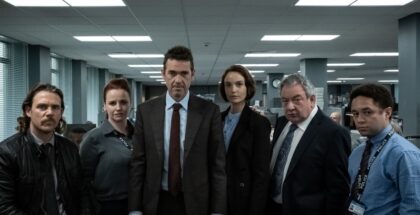True Crime Tuesdays: Mind Over Murder
Review Overview
Nuance
10Catharsis
10Truth
10Helen Archer | On 04, Oct 2022
While much true crime output could be accused of re-traumatising victims, Mind Over Murder is that rare specimen – a documentary series that seeks to heal. Executively produced by Marc Smerling, whose previous work includes Capturing the Friedmans, The Jinx and A Wilderness of Error, it shares with those previous projects both a meticulousness of detail and a polished look. But it’s the innately sensitive input of director Nanfu Wang that raises the series from a spectacle to a truly collaborative affair, which unpacks the decades-long grief and anger of a community in an effort to somehow repair it.
When Helen Wilson, a 68-year-old grandmother, was murdered in 1985, it sent shockwaves through the town of Beatrice, Nebraska. It was a particularly brutal crime – Wilson was tied up, beaten, raped and eventually suffocated, and for a few years it seemed as though the culprit would not be found. Until one Burt Searcey decided to take on the case, first as a self-appointed private investigator and, later, when he re-joined the police force, in an official capacity.
Searcey thought he had all the answers, thanks to a brief interview he had with an informant who put a couple of the town’s misfits in the frame. From there, he managed to elicit confessions from several of those who would come to be known as the Beatrice Six – Joseph White, Thomas Winslow, JoAnn Taylor, James Dean, Debra Shelden and Kathy Gonzalez. But, as the documentary unfolds, we find that these confessions were false, reliant on the psychological fragility of those making them, along with police and prosecutorial malfeasance. The real killer was eventually identified and yet, within the community, the stench of suspicion still lingered around the Beatrice Six.
The first three episodes of this six-part series go over the murder itself, speaking to the family of Helen Wilson, those accused of her killing and the police and law enforcement involved. Wang interviews all the main players – with a few notable exceptions – and, in many ways, it follows the usual form. But, unlike other true crime documentaries, she draws on the community at large – a community you can tell she spent time embedding in in order to gain the trust of the people involved – by framing the series around the preparation for a play, based on the original investigation, which is due to be performed at the local theatre.
While the “let’s put on a play!” angle may seem somewhat jarring in early episodes, the dramatic recreation of real events ultimately proves to reveal the truth to the people who had believed – so vociferously and for so long – in the “fake news” peddled by Searcey and others. As the Beatrice Six’s original interrogations sought to twist things in order to come to a false conclusion, the play itself lays it out in the exact words of the people at the time, yet at a remove from the raw emotion and human failings of those involved, enabling the audience to reconcile what they thought they knew with what actually happened. In doing so, it demonstrates the psychic damage passed down through generations after 36 years of believing flawed evidence, and the difficulty and strength it takes to dismantle false knowledge.
What Wang achieves here is the reclamation of a story that seemed set in stone, by gently forcing those who felt they knew the truth to reevaluate their opinions and make peace with those they thought were monsters. The result is a sensitively rendered portrait of excavated trauma and ultimately a profound catharsis – not only for the viewer, but for the participants of the documentary, who will be forever changed and can hopefully, finally, achieve some much-needed peace.
Mind Over Murder Season 1 is available on Sky Crime. Don’t have Sky? You can also stream it on NOW, for £9.99 a month with no contract. For the latest Sky TV packages and prices, click the button below.

















